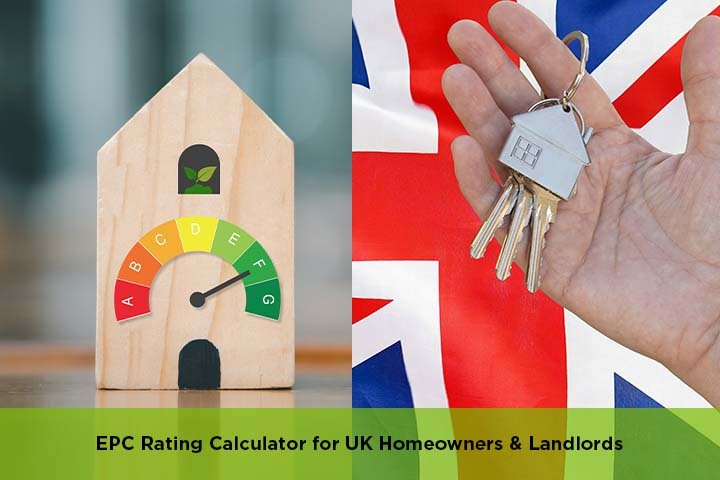An Energy Performance Certificate (EPC) shows how energy-efficient a home is. It shows a rating from A to G, with A being excellent showing that the property uses less energy. G is the worst, meaning the home wastes a lot of energy. A good EPC can significantly lower your energy bills and protect the environment from effects of CO2 emission.
This online EPC calculator provides homeowners sufficient information to check their home efficiency so that they can take precautionary measures beforehand. This guide explains how you can calculate your home EPC rating to get an estimation before receiving an official certificate.
What Does EPC Stand For?
EPC is an acronym for Energy Performance Certificate, which is an official document that rates a property based on its energy performance. The certificate contains a summary of a property in terms of energy use, gas emissions, and improvement suggestions.
This becomes a document that helps the property owners, buyers, or tenants to know how much energy is likely consumed by a property.
What is an EPC Rating?
An EPC rating shows how much energy a home uses. That aspect also covers the CO2 emissions produced. The rating is based on the findings from an energy assessors’ survey that may be certified. The rating is based on a scale, with A being the highest level of performance and G being the lowest.
A property with a higher level A rating may expect lower energy bills. New houses will generally have better ratings than old ones. Thus, an improved rating translates to better value and savings.
What’s Included in EPC Calculation?
An EPC calculation includes various factors. The factors that determine an EPC fall into the following categories:
- Insulation
- Heating systems
- Windows
- Lighting & appliances
- Renewable energy sources
The materials used for the walls, floors, and roof also influence the rating. Efficient heating controls, thermostats, and energy-saving appliances lift the score. Each factor is assessed to calculate the final EPC rating.
Information Required to Calculate Your Home EPC
To calculate your EPC, you need details about your home. This includes:
- Year the property was built
- Type of property (house, flat, bungalow, etc.)
- Size of the home and number of rooms
- Insulation in walls, roofs, and floors
- Type of heating system and its efficiency
- Type of windows (single, double, or triple glazing)
- Lighting efficiency (LED or traditional bulbs)
- Use of renewable energy sources (solar panels, wind turbines) Providing accurate details ensures the best estimate of your EPC rating.
Grades on EPC Rating
EPC ratings are graded from A to G:
- A (92-100) – Most energy-efficient homes with the lowest energy bills.
- B (81-91) – Very good energy efficiency with minor improvements needed.
- C (69-80) – Average energy efficiency, common for most UK homes.
- D (55-68) – Slightly below average, higher energy use and costs.
- E (39-54) – Poor energy efficiency, needs significant improvements.
- F (21-38) – Very poor energy efficiency, high heating costs.
- G (1-20) – Least energy-efficient homes, most expensive to heat. Higher grades mean lower energy costs and a more comfortable home.
Why is this Document Important?
An EPC is important for homeowners, landlords, and tenants. It provides information about energy efficiency and running costs. Buyers and renters use EPCs to compare properties.
Landlords must meet minimum energy efficiency standards. Mortgage lenders and insurance companies may also consider EPC ratings. A higher EPC rating can increase property value and reduce carbon footprints.
How is an EPC Rating Calculated?
An EPC rating is based on many factors. These include insulation, heating systems, windows, and lighting. A home with better insulation will have a higher rating. A home with an old boiler may have a lower rating.
Double-glazed windows help keep heat inside and improve the rating. Energy-efficient lighting can also boost the score. The EPC calculator considers all these factors to give a final rating.
Process to Calculate Your Home EPC
This online calculator does not use any formula or equation to find your home’s EPC. Instead, it helps you understand how officials calculate your EPC. If you want to estimate your EPC yourself, you need to consider the following factors:
| Factors | Detail | Weightage in EPC Calculation | Extent on EPC |
|---|---|---|---|
| Heating System Efficiency | Type & source of heating: Coal, Oil, Gas or Electric, or renewable energy | 27% | Very High impact |
| Condition of Home Insulation | Loft Area | 13% | High impact |
| Cavity Walls | 10% | High impact | |
| Solid Walls | 5% | Medium impact | |
| Underfloor Area | 4% | Low impact | |
| Type & Condition of Windows | Age of window, Single, Double or Triple pane | 8% | High impact |
| Warm Water Supply in Winters | From the main system | 7% | Medium impact |
| Smart Control | Use energy only when needed | 7% | Medium impact |
| Lighting & other appliances | Whether using traditional or modern | 4% | Low impact |
| Other factors | HVAC system, location, building structure, etc. | 14% | Low impact |
Estimating Your EPC
Evaluation of Your Property by an Official: When the official evaluator checks your property, they look for areas that lose the most heat, like the loft, walls (internal or external), floors, or windows. If your loft has a pitched roof with less than 250mm of yellowish insulation, they will recommend upgrading it immediately.
EPC Scoring: Loft and cavity wall insulation have the most impact on your EPC rating. For example, if your loft has proper new insulation, it will get a full score of 14 out of 14. But if there was no insulation before, the score will be 0 out of 14, and so on.
Role of ErP rating of Your Heating System: The heating system also has a big impact on the EPC rating. If it is highly energy-efficient, its ErP (Energy-Related Products) rating will be high.
ErP measures how well the system converts energy into heating for the home or water. For example, if a home has a condensing gas boiler with over 90% efficiency—like those installed through free government grants—it should get at least 23 out of 25 points.
Finally, you can give a score to each parameter listed in the table above and add them up to get a subtotal. The total score will give you an estimated EPC rating for your property.
EPC Calculator Formula
The EPC calculator follows a specific formula. It considers energy input, energy efficiency, and carbon emissions. The calculation includes:
- Heat loss through walls, floors, and roofs
- Efficiency of heating systems and controls
- Energy used for lighting and appliances
- Renewable energy contributions (solar panels, wind turbines) The final score is converted into an EPC rating between A and G.
Who Calculates Your EPC?
Only certified energy assessors can issue an EPC. They conduct property surveys to collect data. Assessors enter the details into government-approved software.
The software generates the EPC rating and recommendations for improvement. Homeowners can find a registered assessor through official UK websites.
Validity of an EPC
An EPC is valid for ten years from the date of issue. After ten years, a new assessment is required. If major energy improvements are made, homeowners may choose to get an updated EPC sooner. A valid EPC is required when selling or renting a property.
How to Get an Official EPC?
To get an official EPC, follow these steps:
- Find a government-approved energy assessor.
- Schedule an assessment of your home.
- The assessor visits and records details about energy efficiency.
- The data is processed through approved software.
- The official EPC certificate is issued and valid for ten years.
Who Needs an EPC?
An EPC is required for:
- Homeowners selling their property
- Landlords renting out a property
- Builders constructing new homes
- Property owners applying for energy efficiency grants If a home is not being sold or rented, an EPC is not required by law.
Using an EPC Rating Calculator
An EPC rating calculator estimates a home’s energy efficiency. It asks for details about the home, like size and heating system. The calculator also checks insulation, windows, and lighting.
After entering the details, it gives a predicted EPC rating. This helps homeowners understand how efficient their home is. It also suggests ways to improve the rating. Many websites offer free EPC rating calculators for UK homes.
Top Features of This Online EPC Calculator
- Easy-to-use interface for quick estimates
- Provides instant EPC rating results
- Suggests energy efficiency improvements
- Uses real data to provide accurate predictions
- Helps landlords and homeowners plan for improvements Using an EPC calculator helps homeowners save money and improve energy efficiency.
Ways to Improve an EPC Rating
The greater the EPC rating, the lesser would be the energy bills and the more comfortable the house. This is done by adding insulating material to walls and roofs. An obsolete boiler can always be replaced with a new, efficient one.
Double-glazing would improve the rating. Energy savings should be achieved by using LED bulbs, not incandescent. Solar panels will fetch more renewable energy and add points to the rating. In addition to that, these changes will boost the value of the home and cut down on energy expenses.
Government Schemes for Energy Efficiency
The UK government offers schemes to help improve EPC ratings. ECO4 scheme offers energy-saving initiatives like free boiler replacement, heat pump with solar panels and free home insulation to boost your EPC from below D to A, B or C.
Also, the Great British Insulation Scheme (GBIS) also helps with the costs of insulation to upgrade inefficient homes for higher EPC and energy savings.
All these schemes help assist homeowners with making their homes more energy efficient. Determining eligibility for these schemes can assist with saving money and improving EPC ratings.
EPC Rating for Landlords
Landlords now should see if their rental properties meet energy efficiency regulations. Minimum EPC rating for rental homes is E. Properties with an F or G rating would have to be improved by landlords.
Not meeting it may lead to fines. A landlord may choose to see an EPC calculator whether his property falls on such a rating. Improvements can attract tenants and raise property value. Government money is available to help landlords get on-board with becoming energy efficient.
Conclusion
An EPC rating shows how energy-efficient a home is. A good rating helps save money and protect the environment. The EPC rating calculator is a useful tool for homeowners and landlords.
It estimates energy efficiency and suggests improvements. Improving a home’s rating can increase its value and lower energy bills. Government schemes can help with costs. Checking and improving an EPC rating benefits everyone.
Frequently Asked Questions
Yes, you can estimate your home EPC by finding how much energy your property uses per square metre, and how much energy it loses.
A-rated EPC homes are considered the most energy efficient as well as eco-friendly for living. As the rating moves further, the efficiency gets lower.
Formula to calculate your energy efficiency rating (energy efficiency) = useful output energy ÷ total input energy.







